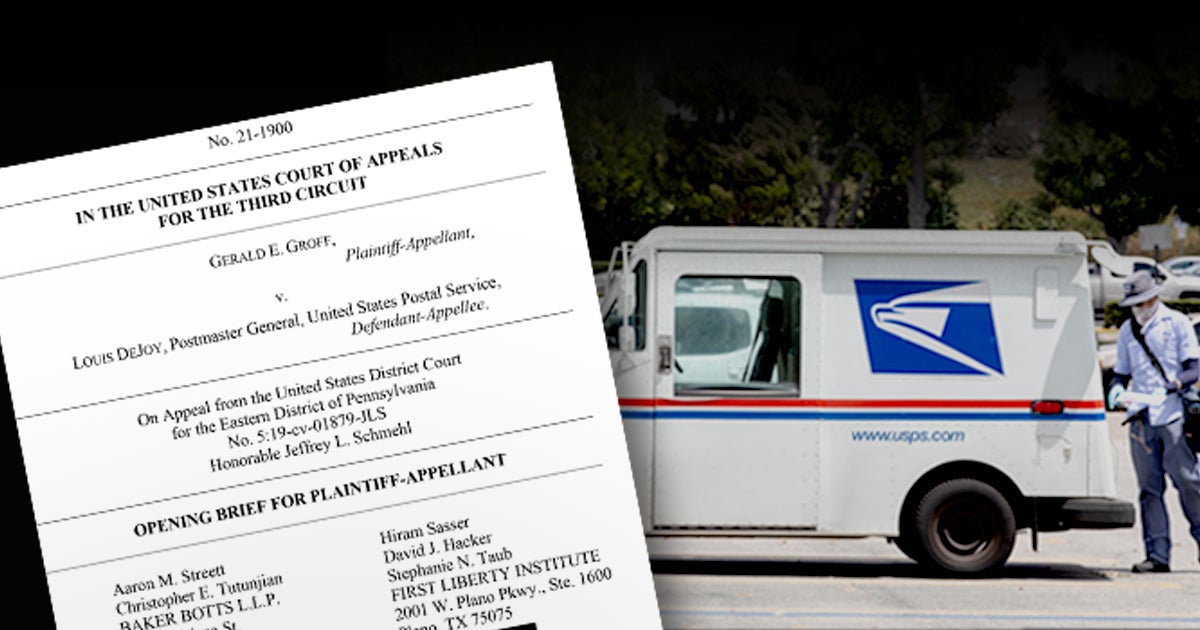
by Jorge Gomez • 5 min read
First Liberty recently filed an appeal at the U.S. Court of Appeals for the Third Circuit on behalf of our client, Gerald Groff, after the U.S. Postal Service (USPS) refused to grant him an accommodation for Sunday Sabbath.
Our legal team—working alongside our volunteer attorneys at Baker Botts LLP, as well as the Church State Council, the Cornerstone Law Firm, and the Independence Law Center—are urging the Third Circuit to reverse a lower court decision that allowed the USPS to force Groff to work on Sundays.
Groff was employed by the USPS beginning in 2012 at the Quarryville Post Office in Lancaster County, Pennsylvania, where he eventually became a Rural Carrier Associate.
Like millions of Americans across the country, Groff is a Christian who believes that he must remember a Sabbath day and “keep it holy” and requested a religious accommodation, which his supervisor initially granted.
However, after a conflict later arose between Groff’s duties as a mail carrier for USPS and his observance of the Sunday Sabbath, USPS offered only proposals that would still require Groff to work on Sundays and thereby violate his conscience and beliefs.
This caused Groff to lose his job, which prompted him to file a lawsuit for religious discrimination.
A district court ruled against Groff and sided with the USPS. The lower court’s ruling concluded that a reasonable accommodation need not eliminate the conflict between work and religion and that accommodating Groff would pose an undue hardship on USPS.
First Liberty is stepping in to vindicate Groff by asking the Third Circuit to reaffirm what federal law clearly states: Employers are prohibited from discriminating against employees on the basis of religion.
In our appeal we argue that the postal service’s decision is wrong and illegal for several reasons.
We explain that as a federal employee, Groff was protected by Title VII of the Civil Rights Act from discrimination based on his religious beliefs and practices, which means the USPS was obligated to provide an accommodation for his religious exercise.
Additionally, we also make it clear that Groff was willing to work additional shifts on days other than Sundays and for several years the USPS successfully accommodated him without undue hardship.
Indeed, the USPS should have recognized Groff’s beliefs that he must observe the Sunday Sabbath and granted him a religious exemption.
A Proven Record: Delivering Religious Freedom in the Workplace
Unlike at any point in our country’s history, Groff and people of faith from coast to coast face intense pressure from employers (both in government and in the private sector) to violate their religious beliefs or lose their job altogether.
Right now, not only are we fighting on behalf of Groff, but First Liberty is also representing Zach Stevens, a physician assistant who was fired for his religious beliefs.
Our attorneys also continue a nearly six-year long legal battle for Coach Joe Kennedy, who was fired by a Washington state school district for kneeling in silent prayer after games. We are appealing Coach Kennedy’s case to the U.S. Supreme Court, which presents a rare and historic opportunity to set a precedent that protects the constitutional rights of teachers, coaches and public employees.
The good news is that when First Liberty answers the call to defend American workers, we succeed at reclaiming the rights of people of faith in the workplace. Our record of victories includes important wins for clients such as:
As more companies and government employers appear to be caving to cancel culture and anti-religious bias, it’s people of faith who are often reduced to second-class citizens in the workplace, as just about any other right trumps religious liberty.
Together, we must protect the rights of every American to practice their faith without fear of losing their job. Will you join give to First Liberty today and help us deliver more critical victories that safeguard your rights at work?